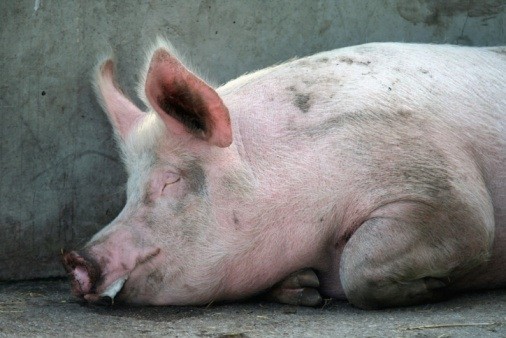China: pork prices have fallen more than 50% since mid-January

Plummeting prices for China’s favourite meat mean a lot of the pigs that trader Zhang Yu is seeing in the market these days are supersized, or at least a little overweight.
Low prices driven by sluggish demand and panic selling over African swine fever outbreaks are causing many farmers to hold onto their herds, and fatten them up, in the hope prices will rebound.
“If they sell at the current price, they will certainly lose money,” said Zhang, who lives in a small town in the northeastern province of Liaoning.
“Many pigs weigh more than 150kg now,” he said. “If you sell one below 150kg, the money you get can’t even cover the expense of buying a piglet.”
The price of pork in China, the world’s leading consumer, has plunged more than 54 per cent since mid-January, touching 21.5 yuan (US$3.4) per kilogram as of last Friday, according to data from the Ministry of Agriculture and Rural Affairs.
To combat the price volatility and stabilise production, the government announced this week it would improve its monitoring of the market and tap its pork reserves.
The National Development and Reform Commission (NDRC) said on Wednesday it would start keeping track of the number of breeding sows in a herd and the average retail price of pork in major cities.
It also raised the hog-to-grain ratio, which takes the price of a pig and divides it by the cost of the corn needed to feed it, to reflect higher production costs among farmers.
The NDRC, China’s top economic planning agency, said the new system would help fine-tune its early warning system, which alerts it to changes in the market so it can manage price volatility through its pork reserves.
First established in 1979, China’s meat reserves are designed to allow the government to respond to emergencies that cause abnormal market fluctuations.
The NDRC also said on Wednesday it would significantly increase its stocks and set up a temporary reserve to regulate prices by buying from the market when prices are too low, and releasing supplies when prices are too high.
China’s low wholesale pork prices have been driven mainly by panic selling because of new African swine fever outbreaks, said Pan Chenjun, a senior analyst for animal protein at Rabobank. The disease first appeared in China in 2018, ravaging the country’s hog herd and causing food prices to surge in 2019-20.
Pan said the sow herd monitor would be a good indicator to forecast the hog supply in the coming months.
Farmers are also offloading pigs as prices decline and hot summer weather suppresses consumers’ appetites, said Cao Hui, an analyst from market intelligence provider Sublime China Information (SCI).
Millions of small farmers, who account for more than half of the total pork production of the country, have been hard hit by the plummeting prices, according to analysts.
“After the African swine fever outbreak, the general expense of the whole industry has greatly increased,” said Feng Yonghui, chief analyst at meat industry portal Soozhu.com.
The sector’s price volatility, described as the “pig cycle” by industry experts, has been made worse by the strong presence of small retail farmers in China, whose production and management abilities were not as good as large farms, analysts said.
“Their relatively unstable production capacity … will amplify the risk of market price fluctuations,” Cao said. “This is also the core problem of the pig cycle.”
The market share of retail farmers has shrunk since the African swine fever hit, while tumbling pork prices this year have forced many to exit the market, according to Yang Xidi, executive director of Yunnan Kunzhou Agriculture, an agricultural technology company.
“The new stabilising price mechanism is mainly targeted at those small farmers, because just like retail investors in the stock market, their investment choices are not usually rational,” Yang said. “They need more such guidance from the government compared with the large farms.”
Read also
Wheat in Southern Brazil Impacted by Dry Weather and Frosts
Oilseed Industry. Leaders and Strategies in the Times of a Great Change
Black Sea & Danube Region: Oilseed and Vegoil Markets Within Ongoing Transfor...
Serbia. The drought will cause extremely high losses for farmers this year
2023/24 Safrinha Corn in Brazil 91% Harvested
Write to us
Our manager will contact you soon



